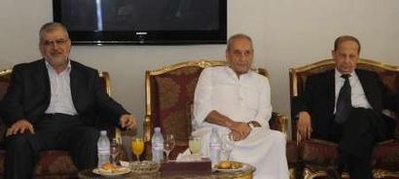 Rival leaders appeared back at square one on the fourth day of intense bargaining in Doha but mediators managed to get the talks going and maintained hope that a deal could still be reached to pull Lebanon back from the brink of a civil strife. Government and opposition leaders have been in Qatar for several days amid heightened tension following violence in Lebanon earlier this month. The two sides were considering a plan proposed by Qatar to form a unity cabinet and postpone talks on a controversial draft election law. Qatari leaders suggested postponing a decision over disputed election legislation and moving directly to a parliamentary vote to name army chief Michel Suleiman as president. They also proposed forming a unity government of 30 ministers, with 13 ministers from the parliamentary majority, 10 from the opposition and seven to be chosen by the elected president. Rival factions are agreed on electing Mr Suleiman as a president to succeed the President Emile Lahoud, whose term ended in November. But they have fallen out over power-sharing in a unity government. Parliamentary majority leader MP Saad Hariri announced on Monday that he would not return to Beirut until a settlement is reached. Opposition leader Michel Aoun told Lebanon’s Orange TV. that the government side was offering the opposition veto power in a future national unity government, as long as the Hezbollah-led side agrees to a government-drafted election law. Aoun called the suggestion "childish" because the national unity government would only rule Lebanon until the next parliamentary elections in May 2009. "They wanted to share a government with us for 11 months, then take the state and presidency for four years," Aoun said. Lebanese state-run National News Agency said a "declaration of intentions" is expected later Monday
Rival leaders appeared back at square one on the fourth day of intense bargaining in Doha but mediators managed to get the talks going and maintained hope that a deal could still be reached to pull Lebanon back from the brink of a civil strife. Government and opposition leaders have been in Qatar for several days amid heightened tension following violence in Lebanon earlier this month. The two sides were considering a plan proposed by Qatar to form a unity cabinet and postpone talks on a controversial draft election law. Qatari leaders suggested postponing a decision over disputed election legislation and moving directly to a parliamentary vote to name army chief Michel Suleiman as president. They also proposed forming a unity government of 30 ministers, with 13 ministers from the parliamentary majority, 10 from the opposition and seven to be chosen by the elected president. Rival factions are agreed on electing Mr Suleiman as a president to succeed the President Emile Lahoud, whose term ended in November. But they have fallen out over power-sharing in a unity government. Parliamentary majority leader MP Saad Hariri announced on Monday that he would not return to Beirut until a settlement is reached. Opposition leader Michel Aoun told Lebanon’s Orange TV. that the government side was offering the opposition veto power in a future national unity government, as long as the Hezbollah-led side agrees to a government-drafted election law. Aoun called the suggestion "childish" because the national unity government would only rule Lebanon until the next parliamentary elections in May 2009. "They wanted to share a government with us for 11 months, then take the state and presidency for four years," Aoun said. Lebanese state-run National News Agency said a "declaration of intentions" is expected later Monday



